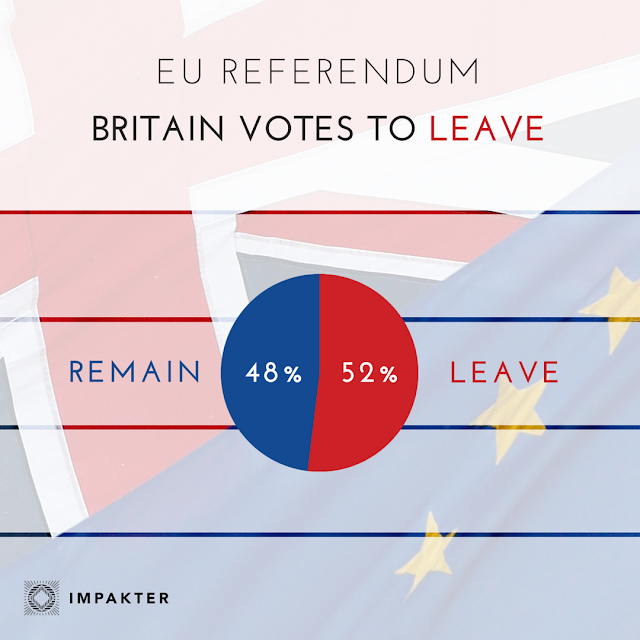I was involved in an experiment on Impakter: we launched a "Brexit Opinion Tracker" gathering the opinions and statements of major influencers and politicians as the Brexit referendum unfolded on 23 June, using the articles uploaded on our social media platform Thingser under the hashtag "Brexit" - this way we tracked what was happening in real time.
Then, today, with the stunning vote announced, I quickly dashed off a "wrap up note" to assess the situation. Here it is:
Wrap-Up Note: The Brexit Dream Likely to Turn into a Nightmare
While the vote on 23 June was carried out with quiet and dignity, as exit polls were (wisely) banned which contributed to the maintenance of order, the outcome is stunning: 52% for leaving the EU, over 17 million voters, against 15.9 million for the Remain camp.
UKIP's secretary Nigel Farage exulted, "“Dare to dream that the dawn is breaking on an independent United Kingdom.” Unfortunately, that dream could quickly turn into a nightmare as the predictions of a deep economic downturn become real.
And the downturn has already started. Prime Minister Cameron immediately announced his resignation, opening up a government crisis in the UK.
Shock waves hit the EU as well. A quick reaction came from Martin Schulz, the president of the European Parliament, who said the assembly would hold an emergency session on Tuesday to address Brexit. The European Council President Donald Tusk also announced the 27 EU bloc is "determined to keep our unity" and will assess a course of action "to avoid a chain reaction" (as Martin Schulz put it) in a EU summit meeting next week - or at least on the margins of it, as he plans to schedule meetings with EU leaders without Prime Minister Cameron.
When markets opened in Asia on the morning after (24 June), stock prices plummeted, along with the British pound. In a way, this is surprising, financial markets are rarely wrong and they had bet on the Remain camp, yet, this time, they turned out to be quite wrong. Markets had, it seemed, not given sufficient weight to the emotions the Leave campaign had stirred up in the British population, playing on fears of immigration.
So, Brexit was in the cards and to the end it was a very close call, with the 52-48 ratio seemingly reversed at first, in the early hours after the polls had closed, in favor of Remain.
Yet, sadly, the murder last week of Jo Cox (41), mother of two, a Labour politician who strongly supported Remain, did not change the cards.
Immigration was the biggest ISSUE in the campaign
The biggest issue aside from xenophobia, nativism and even racism as we have seen from UKIP members. Objectively, with net migration to Britain of 330,000 people in 2015, more than half of them coming from the European Union, there was little Mr. Cameron could do. And, as argued again and again, while immigrants contributed more to the economy and to tax receipts than they cost, many Brits felt that their "national identity was under assault and that the influx was putting substantial pressure on schools, health care and housing."
The real problem is that the European project, instead of being seen as a solution to war and poverty intended to ensure prosperity and security, is seen as a threat to "national identity".
You'll find the rest of the analysis on Impakter, click here.


Comments